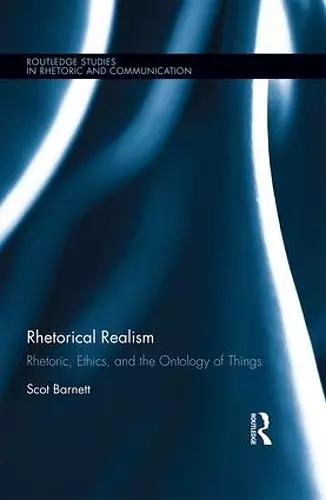Rhetorical Realism
Rhetoric, Ethics, and the Ontology of Things
Format:Hardback
Publisher:Taylor & Francis Ltd
Published:8th Dec '16
Currently unavailable, and unfortunately no date known when it will be back
This hardback is available in another edition too:
- Paperback£42.99(9780367877644)

Rhetorical Realism responds to the surging interest in nonhumans across the humanities by exploring how realist commitments have historically accompanied understandings of rhetoric from antiquity to the present. For a discipline that often defines itself according to human speech and writing, the nonhuman turn poses a number of challenges and opportunities for rhetoric. To date, many of the responses to the nonhuman turn in rhetoric have sought to address rhetoric’s compatibility with new conceptions of materiality. In Rhetorical Realism, Scot Barnett extends this work by transforming it into a new historiographic methodology attuned to the presence and occlusion of things in rhetorical history. Through investigations of rhetoric’s place in Aristotelian metaphysics, the language invention movement of the seventeenth century, and postmodern conceptions of rhetoric as an epistemic art, Barnett’s study expands the scope of rhetorical inquiry by showing how realist ideas have worked to frame rhetoric’s scope and meanings during key moments in its history. Ultimately, Barnett argues that all versions of rhetoric depend upon some realist assumptions about the world. Rather than conceive of the nonhuman as a dramatic turning point in rhetorical theory, Rhetorical Realism encourages rhetorical theorists to turn another eye toward what rhetoricians have always done—defining and configuring rhetoric within a broader ontology of things.
"In the same vein as Thomas Rickert’s Ambient Rhetoric,Barnett offers some of the most original and compelling research to date with respect to rhetoric’s growing interest in nonhuman agency, posthumanism, and material rhetorics. I can see many audiences in rhetorical studies being intrigued with his creative idea to revisit and recast entirely a debate (realism/anti-realism) that our field (falsely) believed to be settled decades ago. In turn, Barnett’s realist approach to rhetorical historiography promises to call into question some of the most well entrenched epistemic and human centered foundations that continue to undergird a great deal of twentieth- and twenty-first century rhetorical theory. For this reason, his research will foster some much needed engagement by rhetoricians regarding Bruno Latour’s basic question to many of our field’s prevailing theoretical interests in postmodernism and poststructuralism: ‘Do you believe in reality?’ " - Steve Holmes, George Mason University, USA
ISBN: 9781138648210
Dimensions: unknown
Weight: 960g
242 pages